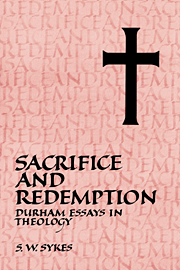Book contents
- Frontmatter
- Contents
- List of contributors
- Prefatory note
- Introduction
- PART I
- 1 Sacrifice and holiness
- 2 Sacrifice and world order: some observations on ben Sira's attitude to the temple service
- 3 Paul's understanding of the death of Jesus as sacrifice
- 4 Hebrews: the final sacrifice
- 5 St Athanasius on Christ's sacrifice
- 6 The doctrine of sacrifice: Augustine and the Latin patristic tradition
- 7 Sacrifice in the early East Syrian eucharistic tradition
- PART II
- PART III
- PART IV
- Index of biblical and ancient references
- Index of persons
1 - Sacrifice and holiness
Published online by Cambridge University Press: 10 March 2010
- Frontmatter
- Contents
- List of contributors
- Prefatory note
- Introduction
- PART I
- 1 Sacrifice and holiness
- 2 Sacrifice and world order: some observations on ben Sira's attitude to the temple service
- 3 Paul's understanding of the death of Jesus as sacrifice
- 4 Hebrews: the final sacrifice
- 5 St Athanasius on Christ's sacrifice
- 6 The doctrine of sacrifice: Augustine and the Latin patristic tradition
- 7 Sacrifice in the early East Syrian eucharistic tradition
- PART II
- PART III
- PART IV
- Index of biblical and ancient references
- Index of persons
Summary
When in English we speak of the institution of sacrifice, we commonly refer to the system of worship which has its most characteristic and effective action in the slaughter of a victim. Sacrifice is pre-eminently bloody sacrifice. But the word has a wider connotation and comprehends the surrender to the deity of some object or possession which may be other than a beast or a bird, for the purpose of propitiation or homage. ‘sacrifice’ may also denote the victim itself or anything else that is offered. A derivative usage is its application to human self-giving. A man may sacrifice comfort or income for the sake of some higher goal, or in war may, as we say, pay the supreme sacrifice.
The picture however becomes progressively less clear as we examine the use of the word ‘sacrifice’ in the English Versions of the Bible, the Vulgate, the Septuagint, the Greek New Testament and the Hebrew of the Old Testament. Neither in the Old Testament nor in the New is there any word for the institution as a whole. Yet in the Authorized Version and the English Versions dependent upon it the noun is used up to two hundred times. In the majority of cases in the Old Testament, ‘sacrifice’ renders the Hebrew word zebah. Although the verb means ‘to kill’, this is the term for a particular sacrifice to be distinguished from the coldh or holocaust. When the two terms occur together, the English Versions, including the New English Bible and Revised English Bible (which for example in Leviticus, carefully distinguishes the zebah as ‘shared-offering’) render them as ‘sacrifice and burnt-offering’, or, in the case of the NEB ‘sacrifice and whole-offering’.
- Type
- Chapter
- Information
- Sacrifice and RedemptionDurham Essays in Theology, pp. 9 - 21Publisher: Cambridge University PressPrint publication year: 1991
- 1
- Cited by



